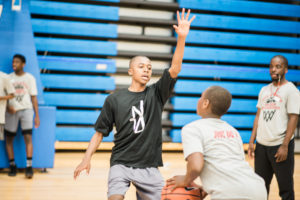
“Mistakes must become part of the learning process. When you consider the mistakes you have made in your life, there is always a potential for learning. Bad performances can lead to good performances, or they can lead to other bad performances if learning is not part of the experience.”
Robert Fritz – Creating
After making a mistake on the court, a basketball player immediately tells himself that he failed or screwed up. This negative self-talk will create negative feelings – like frustration and anger – and often leads to negative behavior. The player lowers his head, argues with one of his teammates or commits a foul against a player from the other team. Then this player labels himself a loser or failure because of that one experience.
The negative thoughts and feelings from the first mistake then triggers another mistake on the court. Because the basketball player is only replaying in his mind what he did wrong, and is choosing to simply judge and criticize himself, the player is creating more anxiety and stress for himself. He then starts to worry how he looks to others on the sidelines and in the stands who are watching the game, and may even begin to pull back from making certain moves or plays because he doesn’t want to look bad.
By making a negative judgment about himself, the player will emotionally struggle on the court and essentially kept himself “in the dark”. He has lost a good opportunity to think clearly and objectively about what just happened in the game and thereby, learn something from that experience and make any necessary adjustments to improve his game.
The next time you make a mistake at a practice or in a game, immediately visualize yourself flipping a light switch on the wall. You are mentally telling yourself that you are “putting light on the experience”. Then take a deep breath. As you inhale, ask yourself what did you just see, and while exhaling, ask yourself what did you just learn. The message is that if you can see clearly, you can learn. And if you can learn, you will become a smarter and better player.
In fact, immediately after making a mistake, whether it’s on the court or in your personal life away from the court, you can tell yourself three simple things: “It’s all good” – “This is helping me grow”, “Thank you”. Or you simply say “Good”, “Growing”, “Grateful”.
-Tony Lanzillo is the founder of Mental Peak and is a mental skills coach. As a mental health professional for over 20 years, Anthony “Tone” Lanzillo has often used the theme of sports to engage and educate his clients about the importance of mental skills in everyday life. It was when his younger son was in the 6th grade, and playing three different sports, that he began exploring how athletes could use mental skills in their practices and games. Since then, Lanzillo has been writing about the mental game of sports for such websites as FirstDown Playbook, Coaches Training Room, Ultimate Hockey Source, Lax Playbook, Online Soccer Coaching, World of Basketball, Athletic Management, Lacrosse All-Stars, Coaches Clipboard and Coach Book. Also, he has shared his ideas and worked with athletes in such sports as softball, boxing, field hockey, football, soccer, basketball and lacrosse.


Leave a Reply